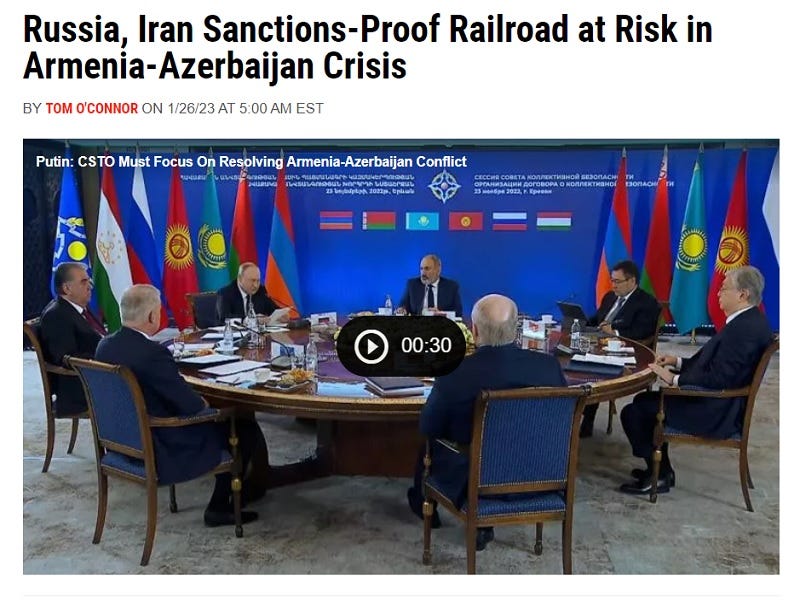Bloomberg’s and Newsweek’s back-to-back efforts to fearmonger about the North-South Transport Corridor’s viability prove that this megaproject provoked panic within the Golden Billion and that this de facto New Cold War bloc can only resort to information warfare in a desperate attempt to mislead others about it.
Newsweek published a piece on Thursday warning that “Russia, Iran Sanctions-Proof Railroad at Risk in Armenia-Azerbaijan Crisis”. The purpose is clearly to fearmonger that another Karabakh Conflict would scupper the North-South Transport Corridor (NSTC), with that chain of unlikely scenarios being the lede for raising wider awareness about both among that outlet’s readers. The problem, however, is that there isn’t any direct connection between these completely separate subjects.
Newsweek’s article appears to be a response of sorts to Bloomberg’s last month that informed the world about just how game-changing the NSTC is poised to become for Eurasian integration. In that piece, this similarly influential US-led Western Mainstream Media (MSM) outlet hinted that India’s and/or other countries’ compliance with the Golden Billion’s sanctions against Russia and/or Iran could become that megaproject’s greatest obstacle.
That was never a credible coping mechanism to begin with, hence why it’s now gradually being done away with by fearmongering about the consequences that another Karabakh Conflict could have in serving this role instead. That, too, isn’t a credible coping mechanism either but it’s at least dramatic and intriguing enough to possibly mislead a larger segment of this de facto New Cold War bloc’s targeted audience. The present analysis will thus concisely discredit this chain of unlikely scenarios.
First, the Armenian military was crushed during the last Karabakh Conflict in late 2020, with its remnants only barely saved by Russia’s diplomatic intervention after Moscow successfully convinced both sides to agree to a ceasefire. Despite the conflict still kindling due to Yerevan’s reluctance to sign a formal peace treaty with Baku for conclusively resolving this decades-long issue, there isn’t any realistic chance that Armenia could ever reconquer that Azerbaijani region that it previously occupied.
Second, it’s all the more improbable that it would expand its prior gains to the point of threatening the Azerbaijani capital and thus severing the planned railroad that Newsweek wrote about for facilitating the overland portion of the NSTC. Third, Azerbaijan also isn’t expected to unilaterally remove itself from the NSTC as punishment against Russia and/or Iran for its displeasure with whatever stance either of them takes towards the far-fetched scenario of yet another Karabakh Conflict.
Fourth, neither of those two would be expected to directly take Armenia’s side in that thought exercise, thus rendering the preceding scenario null and void anyhow. And fifth, even in the extremely fringe chance that any of the prior events unfold like Newsweek fearmongered about, the NSTC still remains viable via Russian-Iranian maritime connectivity across the Caspian Sea. All these points thus compellingly discredit the innuendo aimed at reducing confidence in the NSTC.
This in turn raises the question of why Newsweek pushed those false notions in the first place, which can be answered by remembering that it’s just one of many perception management platforms weaponized by the Golden Billion for manipulating their targeted audience’s views. In this case, that outlet, either on its own due to its ideological support for that de facto New Cold War bloc’s role in the global systemic transition or as a result of shadowy machinations, decided to join this information war.
Upon making that choice, its editors then sought to build upon the narrative pushed by Bloomberg related to the NSTC’s game-changing potential for Eurasia and the strategically disadvantageous consequences this could have for the Golden Billion if that megaproject fully enters into fruition. From there, Newsweek recalibrated its counterpart’s warning about the scenario that could offset that outcome by doing away with the sanctions one and replacing it with another Karabakh Conflict instead.
For all the work put into producing this complementary information warfare product aimed at further reducing confidence in the NSTC, it also failed after its flimsy points were discredited in the present analysis. The takeaway is that Bloomberg’s and Newsweek’s back-to-back efforts to fearmonger about the NSTC’s viability prove that this megaproject provoked panic within the Golden Billion and that this bloc can only resort to information warfare in a desperate attempt to mislead others about it.





In light of the bizarre attack that took place today at the Azeri embassy in Tehran, one must never stop assessing the situation in Baku:
What will happen when the Aliyev dynasty leaves power? Where will this key country in the South Caucasus go due to its geographical location and energy resources? It is worth remembering that according to various sources, Azerbaijan was key during the 90s to sow Islamic extremism and drug trafficking in neighboring Chechnya and Dagestan, working together with the CIA.
Today, everyone knows the close relationship that Baku has developed with Turkey and the ties that it has intensified with Israel and Ukraine since the Second Karabakh War, in spite of Iran's position against foreign intervention in the South Caucasus. Of course, it is in Azerbaijan's interest to participate in the NSTC if it is willing to keep its policy of non-alignment and independence from the United States, the European Union and Russia; however, let's say that it does not stop representing a complex challenge for the region and the plans to consolidate the NSTC.